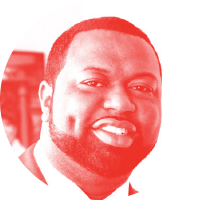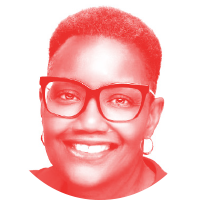Investing With Purpose

Interviewees: Jay Bailey, Karen Freeman-Wilson, Juan Garzón and Benjamin Vann

Jay Bailey
President & CEO of the Russell Innovation Center for Entrepreneurs
Committed to living by his personal motto, “Build as We Climb,” change agent, thought leader, entrepreneur, and emerging philanthropist Jay Bailey has dedicated his life to serving others.

Karen Freeman-Wilson
President & CEO of the Chicago Urban League
Through her work in the public sector in the last three decades, Karen strives to achieve equity for Black families and communities through social and economic empowerment.

Juan Garzón
Executive Director of Innovate Charlotte
Drawing on a decade of experience as an entrepreneur and corporate marketer, Juan supports entrepreneurs as a mentor, facilitator, and pitch expert.

Benjamin Vann
Founder & CEO of Impact Ventures
A passionate advocate of social and economic justice, Ben is focused on empowering entrepreneurs of color to build generational wealth through inclusive entrepreneurship and integrated capital.
In recognition of Jabian Consulting’s 15th anniversary in 2021, Jabian Cares launched Project Amplify — a micro-grant program to support nonprofits that encourage, enable, and position women and minority entrepreneurs for success.
The goal of the initiative is to amplify the success of local entrepreneurs through the establishment of nonprofit partnerships with an organization in each of our four markets that directly supports women and minority entrepreneurs. The program will distribute $175,000 in micro-grants to selected organizations, in addition to coaching, access to our social networks, and professional consulting services assistance.
We sat down with the leaders of each nonprofit organization we’ve partnered with to better understand their impact in the community and how businesses can partner with them to amplify their impact.
Benjamin: The vision for Impact Ventures is that the organization becomes a platform and manifestation of true economic freedom; a means to creating an economy where barriers are removed, and access and opportunity are created.
Jay: The mission of RICE is to empower Black entrepreneurs and small business owners; we envision Black prosperity multiplied through business ownership.
Juan: The vision of Innovate Charlotte is to connect entrepreneurs to the resources that already exist in the community which can support their business. There is an entire ecosystem of resources that can help entrepreneurs take their business to the next level, and Innovate Charlotte exists to serve as a hub for that ecosystem.
Karen: Since 1916, the Chicago Urban League has been fighting for economic equity and social justice for Black families in Chicago. We think of our role as twofold. First, to play a key role in reducing the racial wealth gap in Chicago. Second, to reduce institutional/structural racism.
What is the impact of nonprofit organizations like yours who invest in minority entrepreneurs?
Benjamin: Many individuals who come through our programs are pursuing entrepreneurship for a number of reasons. Too often we hear they are unemployed, underemployed, or have a strong desire to use their talents and skills to create a better world for themselves and others around them. The challenge is that access to the critical social, knowledge, and financial capital is not granted for entrepreneurs of color. Beyond the individual entrepreneur, though, our organization focuses on impacting enterepreneurs’ businesses. We focus on the intellectual, social, and human capital, aiming to increase the confidence of our founders and the viability of their businesses. This in turn, allows those founders to create opportunities for the community, by addressing gaps and unemployment in the economy. Small business owners (defined as <$1M revenue) employ nearly 50 percent of the workforce. If our organization is able to support minority businesses, we are enabling founders to address unemployment.
Jay: By creating the best possible environment for our community of entrepreneurs to develop the strong business skills needed to build sustainable businesses, RICE becomes the epicenter of economic advancement and entrepreneurship for underrepresented communities across the country. When we think about income inequality and closing the wealth gap, creating jobs is a piece of how you can solve that, but creating job creators that are entrepreneurial is critical. The proprietary curriculum being developed is RICE’s Big IDEAS platform — a continuous, experiential, and individualized model that leads companies from INSPIRE to DEVELOP to EXECUTE to ACCELERATE to SCALE. Big IDEAS is the key to RICE’s action plans for our community of Black entrepreneurs to work through their ideas, test them with customers, refine, and build stronger business models that will systematically move the business forward. Not only are we helping Black entrepreneurs build sustainable companies, we are creating a strong community and safe place for Black businesses to lean on one another for support. We are creating a platform that recognizes the power of a supportive community, the impact of peer-to-peer learning and accountability, while addressing the need for continuous individualized support.

Not only are we helping Black entrepreneurs build sustainable companies, we are creating a strong community and safe place for Black businesses to lean on one another for support.
Jay Bailey
Juan: Many entrepreneurs do not even realize that an ecosystem of resources exists which could propel their success. Our organization helps entrepreneurs make connections within that ecosystem. But more than simply making connections, our organization recognizes the importance of intentionality — going out into the community and sharing the message throughout the ecosystem — to reach those entrepreneurs that are historically disadvantaged make the connections needed to succeed.
Karen: There are two ways to grow wealth in the Black community — through the accumulation of real estate and through the development of Black business. Our Center for Entrepreneurship factors squarely into the latter. Our Center was built to help minority entrepreneurs develop businesses, whether a start-up or an established business looking to achieve the next level. We have a series of programs, each tailored to businesses’ specific stages of growth, which provide curriculum and mentoring to help entrepreneurs grow their businesses.
Why is it important for the business community to be engaged with your organization and minority entrepreneurs?
Benjamin: It is important for corporations and members of the business community to understand the social responsibility they have to the communities where their employees and customers live, work, and play. Corporations are just one piece of a larger ecosystem of stakeholders that impact entrepreneurs and the potential growth of minority-owned businesses through procurement. In addition to direct sourcing of diverse suppliers, they can contribute to the economy overall by investing in organizations like Impact Ventures that are developing future small business owners to feed their pipeline.
Jay: Through our supporters, RICE is able to serve as an economic mobility engine for the underserved — driving entrepreneurs and small business owners to innovate, grow, create jobs, and build wealth. Our business community helps RICE to provide our stakeholder companies with access to resources, world-class expertise, and programs that will help them launch and sustain their businesses.
Juan: It is important for business to engage with our organization and to participate in the entrepreneurial ecosystem more broadly. For the ecosystem to work, we need connections to technical talent, product talent, potential investors, potential co-founders, and various other stakeholders. We also need businesses to support these businesses by being customers and buying products. It’s the ecosystem connections that make our organization so valuable to entrepreneurs and thus make it important to invest in organizations like ours. The impact an investment can have on entrepreneurs can have a compounding effect by setting an example for success in communities that don’t typically view success as achievable through these means.
Karen: We depend heavily on the larger business community to share their expertise with our Center for Entrepreneurship clients. Expertise in the area of finance, technology, marketing, communications, and many more subject areas is invaluable to entrepreneurs that wouldn’t typically be able to purchase these types of services. While one or two hours may not seem like a lot to the person offering advice, the time can be priceless to the entrepreneur.

It is important for corporations and members of the business community to understand the social responsibility they have to the communities where their employees and customers live, work, and play.
Benjamin Vann
How can businesses in the community get involved with your organization?
Benjamin: To borrow from the way Jabian describes giving back to the community, there are many ways to get involved — whether it’s through time, talent, or treasure. If time is what you have to give, become an advocate and spend time with our staff or join our board and committees. Share our work on social media or forward our newsletter to someone who might be interested in our work. If you’ve achieved success in business and your career, share your talents by becoming a mentor. And lastly, treasure — anyone can be a philanthropist and donate to our cause — no amount is too small.
Jay: Many of Atlanta’s top companies are investing in RICE (visit russellcenter.org to view the full donors list). You can join them in financial support, employee volunteerism, and executive engagement. Email us at [email protected] to learn how your company’s time, treasure, and talent can help.
Juan: Become a mentor. Set up office hours. There are so many resources needed to produce an event — space, lunch, etc. — that can be sponsored. Host our CO.STARTERS cohort at your business and share how you built your business. Funding is fantastic, but there are also plenty of other opportunities to volunteer and mentor. Tell us how you want to help and we will find a way!
Karen: We always welcome the business community to support our cause. One of the best ways to support is by providing technical assistance to our entrepreneurs through mentorship. The advice, information, and relationships that are built through mentorship live on well past our programs and continue to impact an entrepreneur throughout their journey. Of course, financial assistance through donations is always welcome too.
Describe a recent success story of your organization supporting a minority entrepreneur.
Benjamin: The founder who won our Spring 2021 Accelerator Showcase has started a company called Church Space: “it’s like Airbnb but for churches.” During the height of COVID-19 and stay-at-home orders, churches were heavily impacted and many were forced to close their doors. According to Church Space research, churches are the #1 most underutilized commercial space in America. In addition to physical space, churches are more than just a place of worship. Many have food programs, childcare, financial assistance, and job readiness programs that directly serve the communities around them. Church Space was able to help these same impacted churches generate an additional $23,000 on average during 2020. When she arrived in the program, she quickly deferred financial discussions to her co-founder, not feeling as confident and comfortable with understanding and knowing her financials. Through our program, we were able to increase her confidence, knowledge, and understanding of her financials. By understanding the financial components of her business model, she is now better positioned with a more defined business model and financial projects to steer the company toward growth and sustainability, in turn helping more churches and faith institutions get back to focusing on what matters: their mission.
Jay: Dondre Anderson, co-founder of Symphony Chips, joined RICE as a Founding 100 Stakeholder in 2019 and received mentorship and resources to help his business thrive. RICE connected Dondre to Target executives and his product is now featured in Target stores. RICE also served as a fulfillment center for Dondre’s products.
Susan Simmons Stevenson is the founder and CEO of The Lifecycle Network, a privately held human resources, staffing, and consulting firm based in Atlanta, Georgia. Susan initially joined RICE as a Founding 100 Stakeholder in 2019 and successfully completed programming in RICE’s Accelerate Big IDEAS continuum, where she was able to scale her company. Susan now assists RICE with staffing and HR needs. “At RICE, I’ve made lifelong connections that remind me that I am not alone on this journey as a black business owner,” Susan told us. “I am convinced RICE is the #1 organization committed to creating a culture and community of Black excellence where African Americans thrive!”
Juan: Our programs are relatively new and feedback we’ve received about our CO.STARTERS program is promising. Participants reported a 34 percent increase in their confidence in their entrepreneurial skills and a 59 percent increase in satisfaction with the resources available to them. By the end of the program, 90 percent of participants reported that they know their next steps, up from 33 percent prior to the program.
Karen: Through our Next One program, we have partnered an organization called Stella V with our partners at PepsiCo. Stella V is a provider of baked goods and the partnership is enabling PepsiCo to offer the product along with sales to existing clients.
To learn more about Project Amplify and our partners, visit jabian.com/project-amplify
